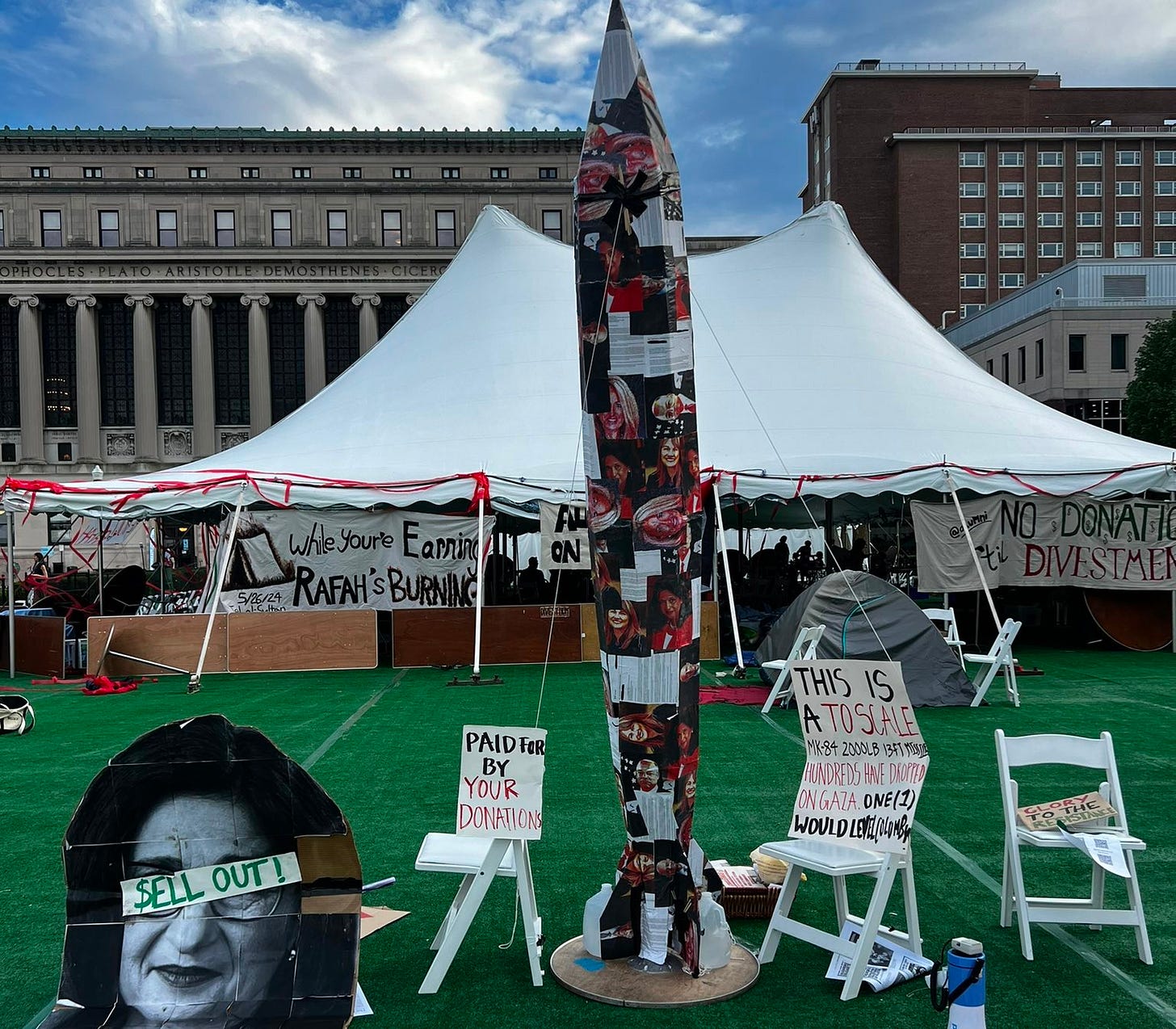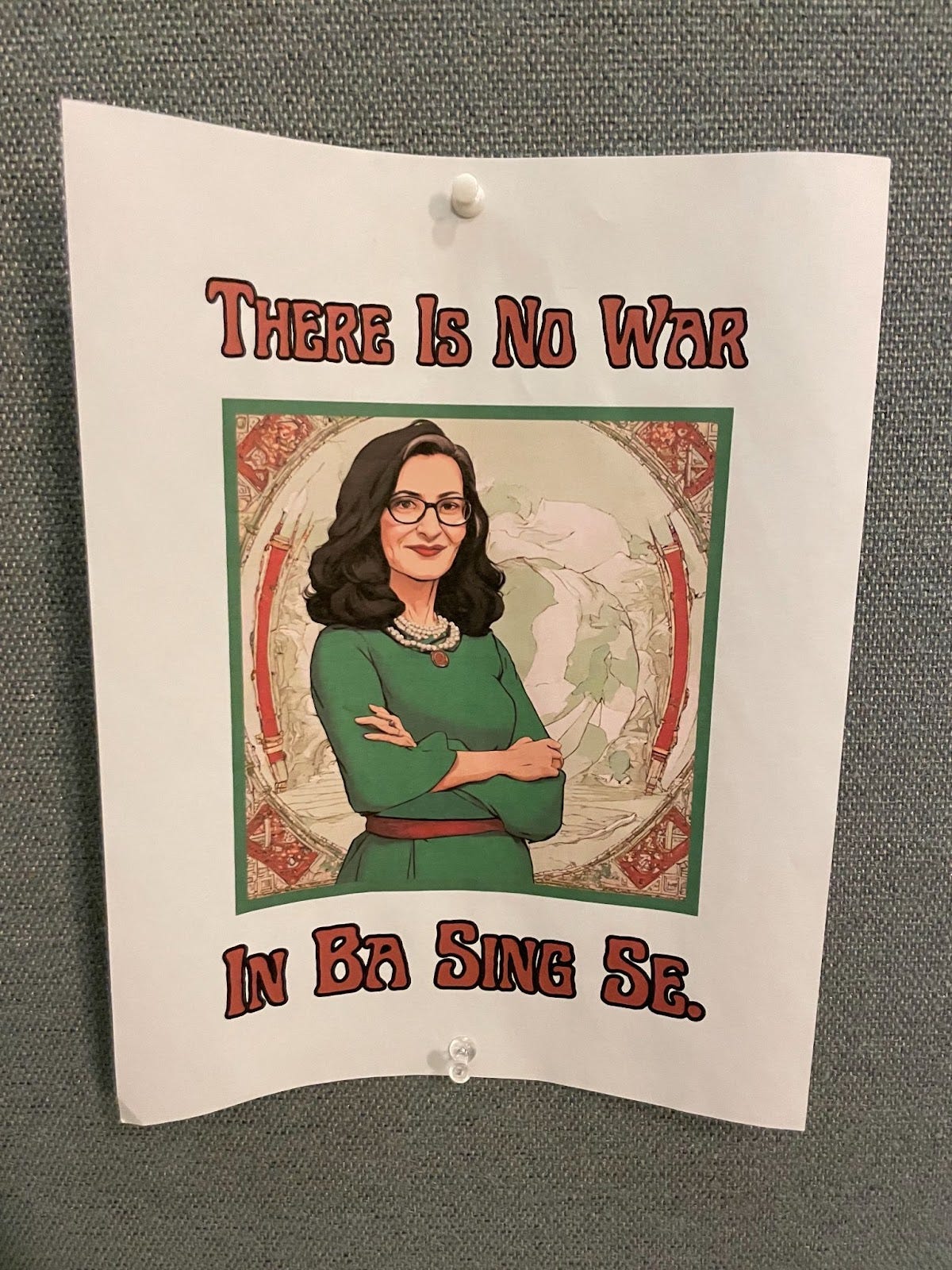Sundial's Summer 2024 News Roundup
The news you wished you missed this summer, except we told our writers not to hold back
It’s September, which means welcome back to Morningside Heights! As you get settled into campus, you might be wondering what campus news you missed this summer.
Lucky for you, absolutely nothing happened. Except for the University President resigning. Oh, and Hamilton Hall protestors had their charges dropped. And protestors released crickets into COO Cas Holloway’s apartment building. And something about Columbia deans sending vomit emojis to each other…
Ok fine, there was some news you missed, but to make this school’s unending cycle of scandal more bearable, we’ve summed them up for you in a series of humorous takes.
→ Just promise me you won’t do it again, okay?
Nearly all of the Columbia affiliates arrested in April for occupying Hamilton Hall had their criminal charges dropped by the Manhattan district attorney over the summer.
On June 20, more than seventy supporters of the protestors, including students, faculty, and community members, filed into a Manhattan courthouse, donning keffiyehs, masks, and custom-made “Hind’s Hall” crop tops—the look of the summer.
Within 40 minutes, the students were on their way—the district attorney’s office had announced they were dropping charges against 31 of the 46 protestors initially arrested for storming Hamilton Hall in the early hours of April 30 with hammers, zip ties, and bike locks.
Read editor-in-chief Jonas Du’s full report here.
→ The group chat gets leaked
Deans caught red-handed sending sneering texts about Jewish experiences at Columbia.
I may not be the most well-versed in Columbia’s HR policies, but one of the gazillion required DEI trainings must have covered that there is a limit to the amount of antisemitism you are legally allowed to espouse at a work event, right?
In true Columbia fashion—AKA practicing zero social awareness—four deans were caught exchanging dismissive and sarcastic texts about the experiences of Columbia’s Jewish community at an event literally titled “Jewish Life on Campus.” The event, held on May 31, was part of Columbia’s alumni weekend programming.
Read staff editor Imaan Chaudhry’s full report here.
→ It's an “orange” type of day!
Our beloved administration announces a new system for understanding campus access.
In response to prolonged and total shutdowns of Columbia’s campus during a totally regular and quiet semester, Columbia’s Public Safety department has a plan. A brilliant, showy plan to ensure that nobody gets frustrated when they don’t communicate properly—a plan that washes away all ambiguity! It makes up for all the times they shut down frat row when they could be using their energy on, I don’t know, more important things.
Columbia has opted to color-code the level of campus access.
Public Safety’s scale is a twisted rainbow. Now, it is my job to interpret it.
Green means that campus is totally open, which will be never.
Yellow means that campus will be open, maybe. Oh, and some entrances will be closed, probably. You may find yourself circling the campus several times if you found the line outside of Lerner to be too long. You will try to guess which entrances will be open, but there will never be a logical system; it will be gate roulette, like the staircases of Hogwarts.
Orange means that campus is open to CUID holders only, as well as to select members of Within Our Lifetime who want to celebrate their marriage on the West Lawn.
Red means that campus is only open to essential workers and those who live within the gates, such as protestors who make it onto the lawns and keep a tent up long enough to establish squatter’s rights.
Read staff writer Jack Engel’s full report here.
→ There is no war in Ba Sing Se
President Shafik resigns.
In Avatar: The Last Airbender, a city named Ba Sing Se is the epicenter of a brutal war engulfing the otherwise magical world. Yet, within the official city walls all talk of the war is silenced in exchange for bureaucratic pleasantries and a fake feeling of calm, enforced by the administrative overlords and their arbitrary restrictions.
While my editor-in-chief, Jonas, told me that putting this meme here would make me look like a big nerd, spotting it throughout campus back in April put a smile on my face. Like in Ba Sing Se, at Columbia last semester there was very little if any acknowledgement from those in charge that anything was ever that wrong.
Read managing editor Jackson Cheramie’s full report here.
→ You must be dying to know who won the Mark Van Doren Award for Teaching and the Lionel Trilling Book Award.
It’s the question on everyone’s mind, as it should be.
As evidenced by the past few blips from my fellow Sundial writers, we hear too much in the news about Columbia’s attention-whoring administration. And, surprise, surprise, those headlines are usually not super positive.
Now, I’m all for publicly critiquing a complacent and ineffective group of well-paid bureaucrats, but behind the veil of the “University” with its “leadership” and “administration,” there are actual scholars worthy of recognition. They are often some of the most misrepresented and underpowered forces in academia despite serving as the very backbone of our institution. They have hard jobs, I mean, think about it: They get to set their own hours and write books for fun, and most of them have pretty good job security and…actually, that sounds pretty good. But we should remember they also have to deal with our shit, and they will have a much greater impact on our lives than any administrator.
And that’s why there are no awards for excellent administrator-ing like there are for teaching. Although the pomp surrounding any kind of professorial award is now quite minimal (Spectator doesn’t even cover these awards anymore, but it’s not like they’re super relevant anyway), I want to shout out, in particular, the Mark Van Doren Award for Teaching and the Lionel Trilling Book Award, which Columbia College announced the winners of in May.
Read managing editor Jackson Cheramie’s full report here.









